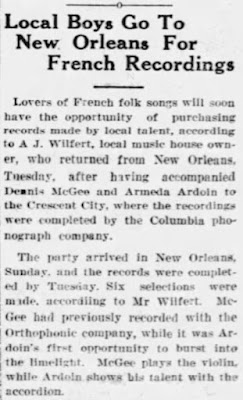 |
| Eunice News Dec 13, 1929 |
The subject matter of many of his songs revolve around his "sweet Joline", a woman he longed to court but who's mother always seemed to send him away from their home. Much of his music dealt with lost of this loved one or his own mortality. In the song, Ardoin seems to be acknowledging the reality of his own death. In translation, one representative passage goes: "I'm going away from you, Joline, so far away / I did say, oh yes, I'm so lonesome for you / There is so much sadness in me — How will I go on, little heart? / I don't know if I'll ever find you again."1
Pardonne-moi, donc chère, ma Joline,J’vas m’en aller, ouais, à la maison,Mais, comment ça se fait, oh ouais ils vont me retourner,Mais, ça m’fait trop d’la peine, mais ouais, te r’voir,Oh ouais, revoir quand toi tu m’as mal fait,J’connais ça me fait du mal pour moi pleurer.Ma Joline, bonsoir jolie Joline,Bonsoir catin, bonsoir, mais ouais, je m’en vas,Tu connais (y a) personne jamais qui va me rejoindre,Jamais encore après ça que tu m’as fait,Ça me fait si dur de quitter de ta maman,Je veux pas de voir des autrements que toi.Comment je vas faire, bye bye, oh ouais, catin,Donc c’est mignonne, c’est toi, ouais ‘tite tête noire,**Mais garde-donc toi**? je te voulais, jolie mignonne,Mais ouais pas de te r’voir, ta chère maman m’a fait,La cause à toi, catin, je pourrais pleurer,Ouais, donc ouais, pleurer, je crois pas ça me fait du bien.
 |
| Amede Ardoin |
As for what occurred in Opelousas, it's a bit of a mystery. The reported winner of the grand prize was a Cajun accordionist named Angelas Lejeune, with McGee accompanying, yet the local papers also noted that fifteen winners were chosen in all. It is likely that Ardoin attracted some attention that weekend.3
So, forgive me, dear, my Joline,
I'm going to leave, yeh, to the house,
Well, that's how it feels, oh yeh, to return,
Well, it hurts me too much, well yeh, to see you again.
Oh yeh, seeing you again when you've done me wrong,I know it hurts for me to cry.My Joline, good night sweet Joline,Goodnight pretty doll, goodnight, well yeh, I'm going,You know there's nobody who will join me ever,Never again after what you've done,It's so hard to leave your mom's place,I do not want to see anything other than you.How will I handle this? Bye, bye, oh yeh, little doll,So, it's my cutie, it's you, yeh, little dark headed girl,Well, look at you, I wanted you, pretty cutie,Well yeh, I'm not able to see you again, your dear mother did this to me,All because of you, little doll, I could cry,Yeh, so yeh, this crying, I do not think this is doing any good.

Thankfully, his sessions proved powerful enough to have him record for Bluebird, Brunswick and Decca records between 1930 and 1934. His recording was placed in an advertisement in the Phonograph Monthly Review in March of 1930. Without this his career in Cajun music, we wouldn't have a slew of songs inspired by his artistic creations. According to musician Mike Doucet:
Without him we would not have the dozen or so songs Iry Lejeune interpreted and recorded in the 1950s that helped to bring about a resurgence of Cajun French pride. We would not have Austin Pitre’s soulful interpretation of “Opelousas 2-Step” nor his version of Amédé’s emotional “Le blues de la prison.” How can we dismiss Dewey Balfa’s version of “Je suis orphelin” or his brother Will’s haunting “Les blues du cadien”?2And with Ardoin's "Mama", Iry Lejeune took this song and made it into his "Lacassine Special" in the late 1940s.
- http://www.npr.org/2011/04/24/135638265/long-lost-love-songs-from-a-cajun-music-pioneer
- http://www.downhomemusic.com/product/amede-ardoin-im-never-comin-back/
- The Kingdom of Zydeco By Michael Tisserand
- Lyrics by Marc C, Stephane F and Jordy A
- Photo by Jeremy S
Amadé Ardoin – Louisiana Cajun Music Vol. 6 : Amadé Ardoin – The First Black Zydeco Recording Artist (1928–1938) (Old Timey)
Cajun Dance Party: Fais Do-Do (Legacy/Columbia, 1994)
Aimer Et Perdre: To Love & To Lose Songs, 1917-1934 (Tompkins Square, 2012)

No comments:
Post a Comment
Got info? Pics? Feel free to submit.